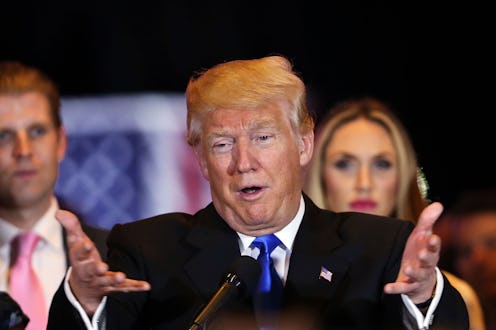News
This Delegate Count Update Helps Explain The Race
The delegate counts have finally spoken, convincing GOP also-rans that it was time to drop out of the race. Republican underlings Ted Kruz and John Kasich both bowed out after losing big time in Indiana after it became clear that they had little to no chance of finding a path to the nomination. What changed so dramatically and all-of-a-sudden? They've been breathing Donald Trump's fumes for months now. Then there's the Democratic party where Hillary Clinton has won big too, but Bernie Sanders is sticking with it. Let's take a closer look at the delegate count in both cases to understand what's going on.
In the GOP race, Trump has made big gains in the last two weeks. Now he has 1,014 delegates, putting him worlds ahead of Cruz and Kasich. They have 546 and 154 respectively. The lead is not necessarily new or big news. Trump has been ahead in delegates since the get-go, but he hadn't gotten close to winning the majority needed to fend off a contested convention. When he won New York with a majority, it was thought to be home-town advantage. But then he went on to win five Northeastern states, hitting the 50-percent mark in all five.
Add to that his Indiana blowout and a majority of bound delegates (1,237) was realistically in Trump's reach, plus it seemed that the delegates were warming to a Trump presidency, and might even consider voting for him in second or third rounds after being unbound. The question now is whether Cruz and Kasich will formally release their delegates before the convention. Marco Rubio may also do so; he won more than Kasich before dropping out. This happened in 2012; both Newt Gingrich and Rick Santorum did so — Ron Paul did not. So far this season, Ben Carson has already released his two Nevada delegates.
In the Democratic race, Clinton, of course is in the lead. Her pledged delegate total is 1,701; Sanders has 1,417. Then of course there are the superdelegates. She has convinced 522 to support her candidacy; Sanders counts 39 on his team. To get a majority, the candidates need 2,383. Sanders came out in first place in Indiana, but it did little to shake up the delegate count. Sanders is claiming, though, that since only superdelegates are going to put her over the top, the convention will be contested and he could get superdelegates to come to his side.
The math just doesn't work, plus that's how the Democratic convention is supposed to work (for better or worse). President Obama didn't pick up any Clinton superdelegates until after she had conceded, so Sanders will be hard-pressed to win any over. In this race, Sanders will not release any delegates or endorse Clinton — at least according to what he says now. His supporters will be able to influence the platform though, perhaps working in a plank for a $15 minimum wage.
The candidates might nearly be set in stone, but the delegate counts will soon reflect the reality of the general election campaign. Keep watching to see when they take home a majority.
